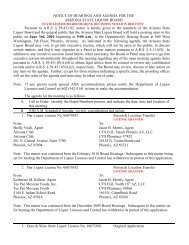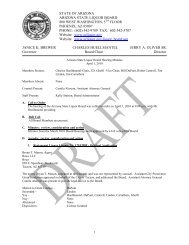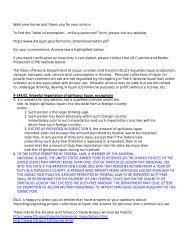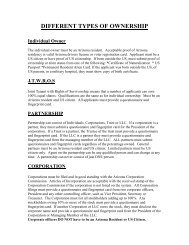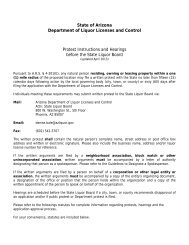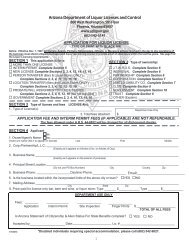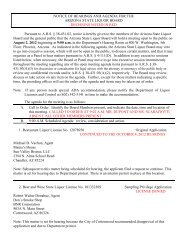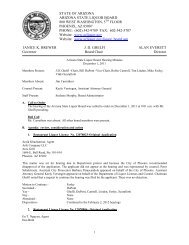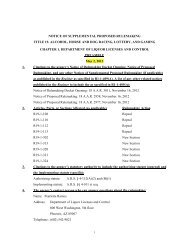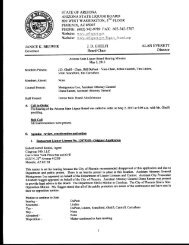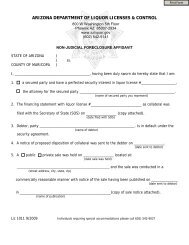Title 4 Law Book - Arizona Department of Liquor Licenses and Control
Title 4 Law Book - Arizona Department of Liquor Licenses and Control
Title 4 Law Book - Arizona Department of Liquor Licenses and Control
Create successful ePaper yourself
Turn your PDF publications into a flip-book with our unique Google optimized e-Paper software.
Failure <strong>of</strong> the licensee to answer may be deemed an admission by the licensee <strong>of</strong> commission <strong>of</strong> the act charged in<br />
the complaint. The director may then vacate the hearing <strong>and</strong> impose any sanction provided by this article. The<br />
director may waive any sanction for good cause shown including excusable neglect. With respect to any violation <strong>of</strong><br />
this title or any rule adopted pursuant to this title that is based on the act or omission <strong>of</strong> a licensee's employee, the<br />
director shall consider evidence <strong>of</strong> mitigation presented by the licensee <strong>and</strong> established by a preponderance <strong>of</strong> the<br />
evidence that the employee acted intentionally <strong>and</strong> in violation <strong>of</strong> the express direction or policy adopted by the<br />
licensee <strong>and</strong> communicated to the employee <strong>and</strong> that the employee successfully completed training in a course<br />
approved by the director pursuant to section 4-112, subsection G, paragraph 2. The director may set the hearing<br />
before himself or an administrative law judge on any <strong>of</strong> the grounds set forth in subsection A <strong>of</strong> this section. Instead<br />
<strong>of</strong> issuing a complaint, the director may provide for informal disposition <strong>of</strong> the matter by consent agreement or may<br />
issue a written warning to the licensee. If a warning is issued, the licensee may reply in writing <strong>and</strong> the director<br />
shall keep a record <strong>of</strong> the warning <strong>and</strong> the reply.<br />
H. A hearing shall conform to the requirements <strong>of</strong> title 41, chapter 6, article 10. At the hearing an attorney<br />
or corporate <strong>of</strong>ficer or employee <strong>of</strong> a corporation may represent the corporation.<br />
I. The expiration, cancellation, revocation, reversion, surrender, acceptance <strong>of</strong> surrender or termination in<br />
any other manner <strong>of</strong> a license does not prevent the initiation or completion <strong>of</strong> a disciplinary proceeding pursuant to<br />
this section against the licensee or license. An order issued pursuant to a disciplinary proceeding against a license is<br />
enforceable against other licenses or subsequent licenses in which the licensee or controlling person <strong>of</strong> the license<br />
has a controlling interest.<br />
J. The department shall provide the same notice as is provided to the licensee to a lienholder, which has<br />
provided a document under section 4-112, subsection B, paragraph 3, <strong>of</strong> all disciplinary or compliance action with<br />
respect to a license issued pursuant to this title. The state shall not be liable for damages for any failure to provide<br />
any notice pursuant to this subsection.<br />
K. In any disciplinary action pursuant to this title, a lienholder may participate in the determination <strong>of</strong> the<br />
action. The director shall consider mitigation on behalf <strong>of</strong> the lienholder if the lienholder proves all <strong>of</strong> the following<br />
by a preponderance <strong>of</strong> the evidence:<br />
1. That the lienholder's interest is a bona fide security interest. For the purposes <strong>of</strong> this paragraph, "bona<br />
fide security interest" means the lienholder provides actual consideration to the licensee or the licensee's predecessor<br />
in interest in exchange for the lienholder's interest. Bona fide security interest includes a lien taken by the seller <strong>of</strong> a<br />
license as security for the seller's receipt <strong>of</strong> all or part <strong>of</strong> the purchase price <strong>of</strong> the license.<br />
2. That a statement <strong>of</strong> legal or equitable interest was filed with the department before the alleged conduct<br />
occurred which is the basis for the action against the license.<br />
3. That the lienholder took reasonable steps to correct the licensee's prior actions, if any, or initiated an<br />
action pursuant to available contract rights against the licensee for the forfeiture <strong>of</strong> the license after being provided<br />
with notice by the department <strong>of</strong> disciplinary action as provided in subsection J <strong>of</strong> this section.<br />
4. That the lienholder was free <strong>of</strong> responsibility for the conduct which is the basis for the proposed<br />
revocation.<br />
5. That the lienholder reasonably attempted to remain informed by the licensee about the business'<br />
conduct.<br />
L. If the director decides not to revoke the license based on the circumstances provided in subsection K <strong>of</strong><br />
this section, the director may issue an order requiring either, or both, <strong>of</strong> the following:<br />
1. The forfeiture <strong>of</strong> all interest <strong>of</strong> the licensee in the license.<br />
2. The lienholder to pay any civil monetary penalty imposed on the licensee.<br />
M. If any on-sale licensee proposes to provide large capacity entertainment events or sporting events with<br />
an attendance capacity exceeding a limit established by the director, the director may request a security plan from<br />
the licensee that may include trained security <strong>of</strong>ficers, lighting <strong>and</strong> other requirements. This subsection exclusively<br />
prescribes the security requirements for a licensee <strong>and</strong> does not create any civil liability for the state, its agencies,<br />
agents or employees or a person licensed under this title or agents or employees <strong>of</strong> a licensee.<br />
A.R.S. §4-210.01. Authority to impose civil penalty; training<br />
A. In lieu <strong>of</strong> or in addition to the suspension or revocation <strong>of</strong> or refusal to renew a license authorized by<br />
section 4-210, subsection A, the director may impose a civil penalty <strong>of</strong> not less than two hundred nor more than<br />
three thous<strong>and</strong> dollars for each violation. The licensee is entitled to appeal the decision <strong>of</strong> the director to the<br />
board. The board may affirm, modify or reverse the finding <strong>and</strong> decision <strong>of</strong> the director <strong>and</strong> may decrease the civil<br />
penalty imposed by the director.<br />
B. The director may establish payment <strong>of</strong> the civil penalty as authorized in subsection A <strong>of</strong> this section, by<br />
32<br />
June 8, 2012




